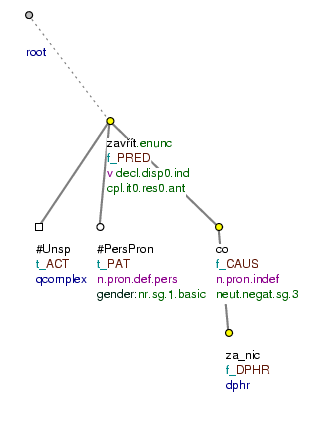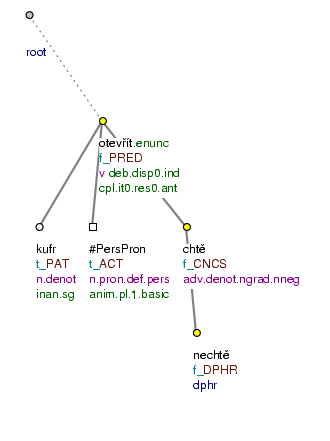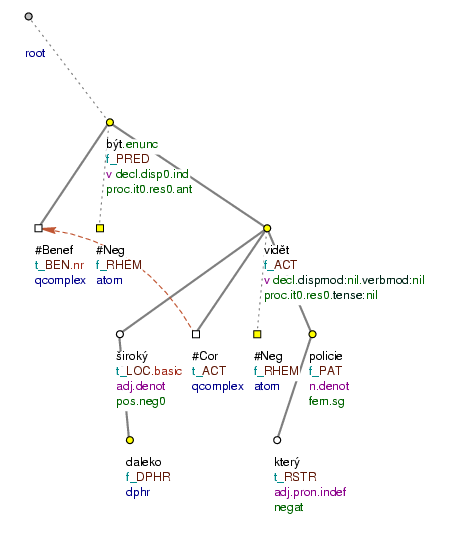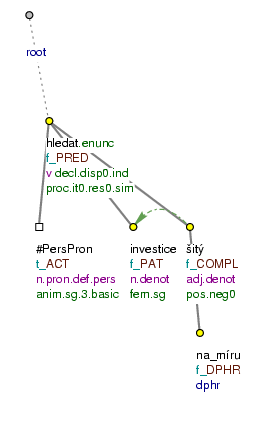By the term non-verbal idiom we mean an idiom the governing part of which is not a regularly inflected verb. The governing part of a non-verbal idiom can be a verb, but then the verb does not occur in the given combination in its whole paradigm, it is always a more or less petrified verb form (e.g.: stůj co stůj (=at any cost); chtě nechtě (=willy nilly)). The dependent parts of the idiom have no further modifications.
Non-verbal idioms are represented in the tree according to the rules specified above - Section 8, "Idioms (phrasemes)". The only problematic issue can be deciding which part of the idiom is the governing part.
The governing part of a non-verbal idiom. In case the governing part cannot be determined on the basis of syntax, the governing part is the first part of the non-verbal idiom (in the surface word order).
Examples:
Zavřeli mě pro nic.CAUS za nic.DPHR (=lit. (They) arrested me for nothing for nothing; meaning: they did not have a reason to arrest me) Fig. 6.124
Chtě.CNCS nechtě.DPHR museli jsme kufr otevřít. (=Willy nilly, we had to open the suitcase.) Fig. 6.125
Široko.LOC daleko.DPHR nebylo vidět žádnou policii. (=Far and wide, one could see no police.) Fig. 6.126
Hledá investici šitou.COMPL na míru.DPHR (=He is looking for the right investment ; lit. investment sewn to measure) Fig. 6.127
konec konců.DPHR (=after all; lit. end (of) ends)
zuby nehty.DPHR (=tooth and nail)
chyba lávky.DPHR (=certainly not)
jádro pudla.DPHR (=the heart of the matter; lit. core (of) poodle)
stůj co stůj.DPHR (=at any cost; lit. cost what cost)
pozdě bycha honit.DPHR (=it is no good crying over spilt milk)
!!! Non-verbal idioms are assigned special valency frames in the valency lexicon (see Section 2.2.2, "Valency frames of idiomatic expressions (phrasemes) and complex predicates"); nevertheless not every instance of a non-verbal idiom has a corresponding valency frame. So far only those non-verbal idioms have a valency frame (for all their occurences) that contain a semantic noun ending with -ní or -tí in their governing part.
!!! All non-verbal idioms that occured in PDT are listed in the appendix (see Appendix D, Non-verbal idiomatic expressions).
!!! We do not represent as idioms those non-verbal collocations that have regular inflection, e.g.: horký.RSTR brambor (=a thorny problem; lit. hot potato).
Figure 6.124. Non-verbal idiom

Zavřeli mě pro nic za nic. (=lit. (They) arrested me for nothing for nothing)
Figure 6.125. Non-verbal idiom

Chtě nechtě museli jsme kufr otevřít. (=lit. Willy nilly (we) had_to AUX (the) suitcase open)

